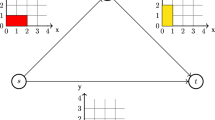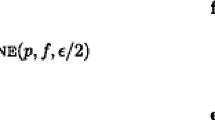Abstract
This paper, of which a preliminary version appeared in ISTCS'92, is concerned with generalized network flow problems. In a generalized network, each edgee = (u, v) has a positive ‘flow multiplier’a e associated with it. The interpretation is that if a flow ofx e enters the edge at nodeu, then a flow ofa e x e exits the edge atv.
The uncapacitated generalized transshipment problem (UGT) is defined on a generalized network where demands and supplies (real numbers) are associated with the vertices and costs (real numbers) are associated with the edges. The goal is to find a flow such that the excess or deficit at each vertex equals the desired value of the supply or demand, and the sum over the edges of the product of the cost and the flow is minimized. Adler and Cosares [Operations Research 39 (1991) 955–960] reduced the restricted uncapacitated generalized transshipment problem, where only demand nodes are present, to a system of linear inequalities with two variables per inequality. The algorithms presented by the authors in [SIAM Journal on Computing, to appear result in a faster algorithm for restricted UGT.
Generalized circulation is defined on a generalized network with demands at the nodes and capacity constraints on the edges (i.e., upper bounds on the amount of flow). The goal is to find a flow such that the excesses at the nodes are proportional to the demands and maximized. We present a new algorithm that solves the capacitated generalized flow problem by iteratively solving instances of UGT. The algorithm can be used to find an optimal flow or an approximation thereof. When used to find a constant factor approximation, the algorithm is not only more efficient than previous algorithms but also strongly polynomial. It is believed to be the first strongly polynomial approximation algorithm for generalized circulation. The existence of such an approximation algorithm is interesting since it is not known whether the exact problem has a strongly polynomial algorithm.
Similar content being viewed by others
References
I. Adler and S. Cosares, “A strongly polynomial algorithm for a special class of linear programs,”Operations Research 39 (1991) 955–960.
E. Cohen, “Combinatorial Algorithms for optimization problems PhD thesis, Department of Computer Science, Stanford University, Stanford, Ca, 1991.
E. Cohen and N. Megiddo, “Improved algorithms for linear inequalities with two variables per inequality,” in:Proceedings of the 23rd Annual ACM Symposium on Theory of Computing (ACM, New York, 1991) 145–155.
E. Cohen and N. Megiddo, “New algorithms for generalized network flows,” in: D. Dolev, Z. Galil and M. Rodeh, eds.,Proceedings of the 1st Israeli Symposium on the Theory of Computing and Systems, Lecture Notes in Computer Science Vol. 601 (Springer-Verlag, Berlin, 1992) 103–114.
E. Cohen and N. Megiddo, “Improved algorithms for linear inequalities with two variables per inequality,”SIAM Journal on Computing (1993) to appear.
R.W. Cottle and A.F. Veinott Jr., “Polyhedral sets having a least element,”Mathematical Programming 3 (1972) 238–249.
J. Edmonds, “An introduction to matchings,” in:Engineering Summer Conference, The University of Michigan, Ann Arbor (1967) Mimeographed notes.
F. Glover, J. Hultz, D. Klingman and J. Stunz, “Generalized networks: a fundamental computer-based planning tool,”Management Science 24 (August 1978) 1209–1220.
A.V. Goldberg, S.K. Plotkin and É. Tardos, “Combinatorial algorithms for the generalized circulation problem,” in:Proceedings of the 29th IEEE Annual Symposium on Foundations of Computer Science (IEEE Press, New York, 1988) pp. 432–443.
M. Gondran and M. Minoux, “Graphs and Algorithms (John Wiley & Sons, New York, 1984).
K. Kapoor and P.M. Vaidya, “Speeding up Karmarkar's algorithm for multicommodity flows,”Mathematical Programming, to appear.
E.L. Lawler,Combinatorial Optimization: Networks and Matroids (Holt, Reinhart and Winston, New York, 1976).
N. Megiddo, “Towards a genuinely polynomial algorithm for linear programming,”SIAM Journal on Computing 12 (1983) 347–353.
S. Murray, “An interior point conjugate gradient approach to the generalized flow problem with costs and the multicommodity flow problem dual,” manuscript, 1991.
J.B. Orlin, “A faster strongly polynomial minimum cost flow algorithm,” in:Proceedings of the 20th Annual ACM Symposium on Theory of Computing (ACM, New York, 1988) 377–387.
É. Tardos, “A strongly polynomial algorithm to solve combinatorial linear programs,”Operations Research 34 (1986) 250–256.
P.M. Vaidya, “Speeding-up linear programming using fast matrix multiplication,” in:Proceedings of the 30th IEEE Annual Symposium on Foundations of Computer Science (IEEE Press, New York, 1989) 332–337.
Author information
Authors and Affiliations
Additional information
Corresponding author. Research was done while the first author was attending Stanford University and IBM Almaden Research Center. Research partially supported by ONR-N00014-91-C-0026 and by NSF PYI Grant CCR-8858097, matching funds from AT&T and DEC.
Research partially supported by ONR-N00014-91-C-0026.
Rights and permissions
About this article
Cite this article
Cohen, E., Megiddo, N. New algorithms for generalized network flows. Mathematical Programming 64, 325–336 (1994). https://doi.org/10.1007/BF01582579
Received:
Revised:
Issue Date:
DOI: https://doi.org/10.1007/BF01582579




